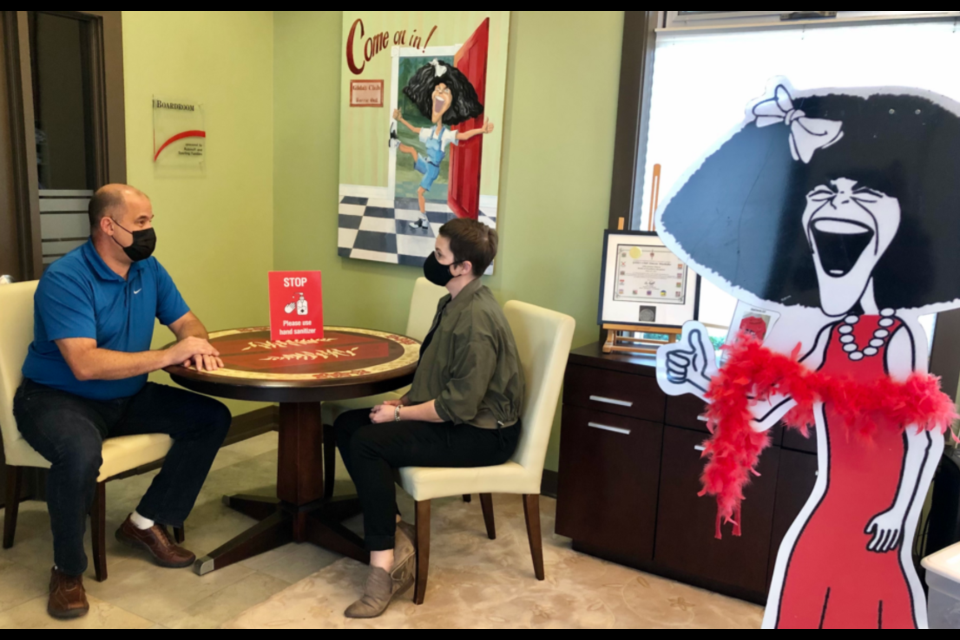Gilda’s Club is almost one of its kind in this country.
The Barrie-based chapter of the international organization designed to provide support, education and hope to all people impacted by cancer is one of two in Canada.
“When it comes to a cancer diagnosis, there’s so many other needs for the person who is diagnosed and for the family, caregivers around that person,” says Aaron Lutes, executive director of Gilda's Club Simcoe Muskoka.
Gilda Radner, a popular comedienne and one of the seven original cast members of the NBC sketch comedy show Saturday Night Live, died of ovarian cancer in 1989.
She famously said the disease gave her "membership to an elite club I'd rather not belong to."
It was her wish that information about her illness would be used to help others.
What resulted was the founding 25 years ago of Gilda’s Club in New York City.
While there are about 50 clubs with more than 170 locations, most are in the United States.
In Canada, there’s only Gilda's Club Greater Toronto and Gilda's Club Simcoe Muskoka.
Now 11 years old, the local club based in Barrie has more than 750 active members — cancer patients and those who care for them tapping into the 70-plus programs provided for free. Last month, 167 people accessed its services.
Lutes points to the Terry Fox Foundation and the annual Terry Fox Run as having had a significant impact on the outcomes of cancers.
“We’re starting to ask the question more and more frequently how to live with cancer,” he says. “With every medical advancement, with every new technology, with every cancer, we become more relevant here at Gilda’s Club on how to be more relevant for the community.”
Cancer is considered the number one disease with nearly one of two Canadians being diagnosed with cancer sometime in their lifetime, according to the Canadian Cancer Society.
The Simcoe-Muskoka community sees just under 3,500 cancer diagnoses per year, Lutes says.
In Barrie, Patricia Gilbert worked to rally the community to develop Gilda’s and its clubhouse to offer a free cancer support program. Anyone impacted by cancer — those affected and the people that surround them — can access the services for free.
During the pandemic Gilda’s adopted a virtual program to help its immune compromised community get the help that they needed safely. That online access, which remains ongoing with in-person activities slowly returning, has meant that the programming is now accessible to people who live further away.
People from Ottawa, Timmins and Cochrane and parts in between have logged in for support.
Many who have been diagnosed with cancer are dealing with stress, fear of the unknown, depression and isolation which has been complicated by the pandemic, Lutes says.
The clubhouse, located on Quarry Ridge Road near Royal Victoria Regional Health Centre, encompasses 10,000 square feet where organizers are starting now to reintroduce some of the physical programming.
Its whole operation is funded through the community with no reliance upon governments.
“We live entirely off donations from individuals, foundations and corporations and I would say that small and local businesses across the community are the ones that have taken a great interest in us,” says Lutes. “The larger groups like the Walmarts and Costcos have done nothing for us over the course of the pandemic, which they’ve benefitted greatly from.
“The small businesses prove their value through how they operate in a community.”
Gilda’s Club manages an annual budget of around $600,000, much of it focused on staff, which Lutes says provides professionally led cancer support programs provided at no charge to those who use the services.
And those programs have been in demand recently.
“In the last two months there has been a steep increase” with five times as many people turning to Gilda’s, he says.
Gilda’s is adding a person to oversee virtual programs to ensure they’re still available to those who need them.
“We’ll expand as the calls for membership happen,” he says. “We need the donors to be able to help and say this is important to keep these resources and grow them to keep up with demand.”
There are programs for adults and children, with 50 to 70 programs running per month.
During the pandemic there has been more of an emphasis on one-on-one counselling.



